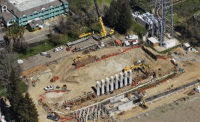Natural Disaster in Slow Motion
As the drought deepens, collateral effects are rippling throughout California. "Rural communities could literally be wiped out by drastic cuts in farm labor and harvesting," Knopf says. "Policymakers who have bought into the notion that conservation is sufficient to address the water issue for farmers and still divert all the water to meet environmental objectives simply do not understand agriculture in the Central Valley."
Attitudes among state officials seem to be shifting in favor of more investment in water infrastructure such as water-recycling plants, pipelines and desalination plants. But, "because those policy discussions and negotiations are under way, there is a level of uncertainty that exists," says Brian Jordan, director of global corporate development for MWH Global in Pasadena. "Ultimately, a combination of supply- and demand-side investments and strategies will be needed."
Many firms are also benefiting from design work to replace California's aging infrastructure. Firms reported $935.4 million in revenue associated with transportation projects in 2013. Revenue from power-related projects rose 17%, while sewer infrastructure projects jumped nearly 50%.
But—as in the rest of the U.S.—there isn't enough public money to fund all of California's required work. "Financial challenges for public agencies continue, and alternative delivery, such as design-build and public-private partnerships, represents a growing market over the next several years," says Teri Zink, West regional business manager and senior vice president of Parsons Brinckerhoff, San Francisco. "We believe that as public revenues rise due to an improving economy, the market will improve."
Designs centered around alternative funding sources can help public owners and utilities balance expenses with revenue streams, says Kristen Miller, MWH business unit leader for municipal water and wastewater. "The focus has shifted from the days of conservative over-design to a much more practical and total cost analysis, bringing in not just the capital costs, but the ongoing maintenance and operational costs that our clients are faced with long after construction is complete."
California's ever-changing regulatory climate can also be fertile ground for business opportunities. "Our firm has invested a lot of time into the new Title 24 Energy Code, which takes effect on July 1," says Scott Wheeler, principal with Auburn-based Engineering Enterprise. "Our expertise in this area has already led us to successful teaming efforts." He also expects Proposition 39 to provide ample work in evaluating schools for potential energy savings.


























